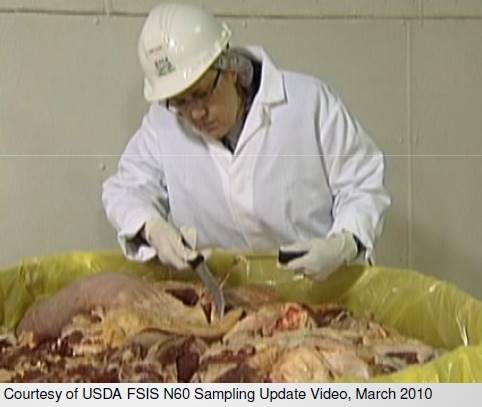USDA Food Safety & Inspection Service
N60 Work Measurements Time Study
George Mason University


The N60 Sample Process
The N60 sample process is a task which is regularly completed by Consumer Safety Inspectors at establishments which produce ground beef from source product either produced in the establishment itself, or purchased from an outside slaughter house. The task name comes from the fact that the inspector must cut 60 individual pieces of beef trim for lab testing. Each piece of sample trim is measured to be approximately one inch wide and three inches long. The trim pieces are then bagged and shipped to labs where they are tested for E-Coli O157:H7.
Click on the picture to get a better idea of what N60 entails.
Escherichia coli (E-Coli) O157:H7
 E-Coli is a bacterium which is one of the most common causes of food poisoning in humans. The USDA officially banned the sale of O157:H7 contaminated ground beef in 1994, and has since been screening ground beef producing establishments to ensure consumer safety. In 2003 the USDA recommended the N60 sample processing in an attempt to combat the spread of O157:H7 and in 2007 made it a regulatory requirement. Today, the N60 sample method is considered the most effective sample procedure for O157:H7 detection.
E-Coli is a bacterium which is one of the most common causes of food poisoning in humans. The USDA officially banned the sale of O157:H7 contaminated ground beef in 1994, and has since been screening ground beef producing establishments to ensure consumer safety. In 2003 the USDA recommended the N60 sample processing in an attempt to combat the spread of O157:H7 and in 2007 made it a regulatory requirement. Today, the N60 sample method is considered the most effective sample procedure for O157:H7 detection.
